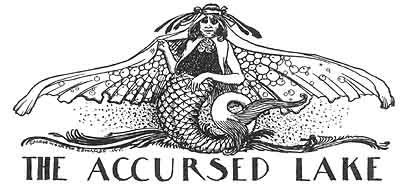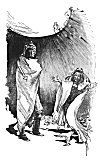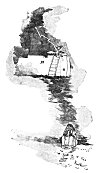
 |
came, centuries ago, part of the people who then founded Isleta, and whose descendants dwell here to this day. Perhaps you would like to know why those lakes are salt now--for my Indian neighbors say that once they were fresh and full of fish, and that the deer and buffalo came from all the country round to drink there. The story is very important ethnologically, for it tells much of the strange secret religion of the Pueblos, and more concerning the, method of initiating a young Indian into one of the orders of medicine-men--both matters which men of science have found extremely difficult to be learned. Here is the story as it is believed by the Tée-wahn, and as it was related to me by one of them.
Long ago there was still a village east of Shoo-paht-hóo-eh, the Eagle-Feather (Manzano) Mountains, and in it lived a famous hunter. One day, going out on the plains to the east, he stalked a herd of antelopes, and wounded one with his arrows. It fled eastward, while the herd went south; and the hunter began to trail it by the drops of blood. Presently he came to the largest lake, into which the trail led. As he stood on the bank, wondering what to do, a fish thrust its head from the water and said:
"Friend Hunter, you are on dangerous ground!" and off it went swimming. Before the Hunter could recover from his surprise, a Lake-Man came up out of the water and said:
"How is it that you are here, where no human ever came?"
The Hunter told his story, and the Lake-Man invited him to come in. When he had entered the lake, he came to a house with doors to the east, north, west, and south, and a trap-door in the roof, with a ladder; and by the latter door they entered. In their talk together the Lake-Man learned that the Hunter had a wife and little son at home.
"If that is so," said he, "why do you not come and live with me? I am here alone, and have plenty of other food, but I am no hunter. We could live very well here together." And opening doors on four sides of the room he showed the Hunter four other huge rooms, all piled from floor to ceiling with corn and wheat and dried squash and the like.
"That is a very good offer," said the astonished Hunter. "I will come again in four days; and if my Cacique will let me, I will bring my family and stay."
So the Hunter went home--killing an antelope on the way--and told his wife all. She thought very well of the offer; and he went to ask permission of the Cacique. The Cacique demurred, for this was the best hunter in all the pueblo, 1 but at last consented and gave him his blessing.
So on the fourth day the Hunter and his wife and little boy came to the lake with all their property. The Lake-Man met them cordially, and gave the house and all its contents into the charge of the woman. 2
Some time passed very pleasantly, the Hunter going out daily and bringing back great quantities

Click to enlarge
THE HUNTER AND THE LAKE-MAN.
of game. At last the Lake-Man, who was of an evil heart, pretended to show the Hunter something in the east room; and pushing him in, locked the great door and left him there to starve--for the room was full of the bones of men whom he had already entrapped in the same way.
The boy was now big enough to use his bow and arrows so well that he brought home many rabbits; and the witch-hearted Lake-Man began to plot to get him, too, out of the way.
So one morning when the boy was about to start for a hunt, he heard his mother groaning as if about to die; and the Lake-Man said to him:
"My boy, your mother has a terrible pain, and the only thing that will cure her is some ice from T'hoor-p'ah-whée-ai [Lake of the Sun], 1 the water from which the sun rises."
"Then," said the boy, straightway, if that is so, I will take the heart of a man [that is, be brave] and go and get the ice for my little mother." And away he started toward the unknown east.
Far out over the endless brown plains he trudged bravely; until at last he came to the house of Shee-chóo-hlee-oh, the Old-Woman-Mole, who was there all alone--for her husband had gone to hunt. They were dreadfully poor, and the house was almost falling down, and the poor, wrinkled Old-Woman-Mole sat huddled in the corner by the fireplace, trying to keep warm by a few dying coals. But when the boy knocked, she rose and welcomed him kindly and gave him all there was in the house to eat--a wee bowl of soup with a
patched-up snowbird in it. The boy was very hungry, and picking up the snowbird bit a big piece out of it.
"Oh, my child!" cried the old woman, beginning to weep. "You have ruined me! For my husband trapped that bird these many years ago, but we could never get another; and that is all we have had to eat ever since. So we never bit it, but cooked it over and over and drank the broth. And now not even that is left." And she wept bitterly.
"Nay, Grandmother, do not worry," said the boy. "Have you any long hairs?"--for he saw many snowbirds lighting near by.
"No, my child," said the old woman sadly.
"There is no other living animal here, and you are the first human that ever came here."
But the boy pulled out some of his own long hair and made snares, and soon caught many birds. Then the Old-Woman-Mole was full of joy; and having learned his errand, she said:
"My son, fear not, for I will be the one that shall help you. When you come into the house of the Trues, they will tempt you with a seat; but you must sit down only on what you have. 1 Then they will try you with smoking the weer, but I will help you."
Then she gave him her blessing, and the boy started away to the east. At last, after a weary, weary way, he came so near the Sun Lake, that the Whit-lah-wíd-deh 2 of the Trues saw him coming, and went in to report.
"Let him be brought in," said the Trues; and the Whit-lah-wíd-deh took the boy in and in through eight rooms, until he stood in the presence of all the gods, in a vast room. There were all the gods of the East, whose color is white, and the blue gods of the North, the yellow gods of the West, the red gods of the South, and the rainbow-colored gods of the Up, the Down, and the Center, all in human shape. Beyond their seats were all the sacred animals--the buffalo, the bear, the eagle, the badger, the mountain lion, the rattlesnake, and all the others that are powerful in medicine.
Then the Trues bade the boy sit down, and offered him a white manta (robe) for a seat; but he declined respectfully, saying that he had been taught, when in the presence of his elders, to sit on nothing save what he brought, and he sat upon his blanket and moccasins. When he had told his story, the Trues tried him, and gave him the sacred weer to smoke--a hollow reed rammed with pee-en-hleh. 1 He smoked, and held the smoke bravely. But just then the Old-Woman-Mole, who had followed him underground all this way, dug a hole up to his very toes; and the smoke went down through his feet into the hole, and away back to the Old-Woman-Mole's house, where it poured out in a great cloud. And not the tiniest particle escaped into the room of the Trues. He finished the second weer 2 without being sick at all; and the[paragraph continues]
Trues said, "Yes, he is our son. But we will try him once more." So they put him into the room of the East with the bear and the lion; and the savage animals came forward and breathed on him, but would not hurt him. Then they put him into the room of the North, with the eagle and the hawk; then into the room of the West, with the snakes; and lastly, into the room of the South, where were the Apaches and all the other human enemies of his people. And from each room he came forth unscratched.
"Surely," said the Trues, "this is our son! But once more we will try him."
They had a great pile of logs built up ("cob-house" fashion), and the space between filled with pine-knots. Then the Whit-lah-wíd-deh set the boy on the top of the pile and lighted it.
But in the morning, when the guard went out, there was the boy unharmed and saying: "Tell the Trues I am cold, and would like more fire."
Then he was brought again before the Trues, who said: "Son, you have proved yourself a True Believer, and now you shall have what you seek."
So the sacred ice was given him, and he started homeward--stopping on the way only to thank the Old-Woman-Mole, to whose aid he owed his success.
When the wicked Lake-Man saw the boy coming, he was very angry, for he had never expected him to return from that dangerous mission. But he deceived the boy and the woman; and in a few days made a similar excuse to send the boy to the gods of the South after more ice for his mother.
The boy started off as bravely as before. When he had traveled a great way to the south, he came to a drying lake; and there, dying in the mud, was a little fish.
"Ah-bóo [poor thing], little fish," said the boy; and picking it up, he put it in his gourd canteen of water. After awhile he came to a good lake; and as he sat down to eat his lunch the fish in his gourd said:
"Friend Boy, let me swim while you eat, for I love the water."
So he put the fish in the lake; and when he was ready to go on, the fish came to him, and he put it back in his gourd. At three lakes he let the fish swim while he ate; and each time the fish came back to him. But beyond the third lake began a great forest which stretched clear across the world, and was so dense with thorns and brush that no man could pass it. But as the boy was wondering what he should do, the tiny fish changed itself into a great Fish-Animal with a very hard, strong skin, 1 and bidding the boy mount upon its back, it went plowing through the forest, breaking down big trees like stubble, and bringing him through to the other side without a scratch.
"Now, Friend Boy," said the Fish-Animal, "you saved my life, and I will be the one that shall help you. When you come to the house
of the Trues, they will try you as they did in the East. And when you have proved yourself, the Cacique will bring you his three daughters, from whom to choose you a wife. The two eldest are very beautiful, and the youngest is not; but you ought to choose her, for beauty does not always reach to the heart."
The boy thanked his fish-friend and went on, until at last he came to the house of the Trues of the South. There they tried him with the weer and the fire, just as the Trues of the East had done, but he proved himself a man, and they gave him the ice. Then the Cacique brought his three daughters, and said:
"Son, you are now old enough to have a wife, 1 and I see that you are a true man who will dare all for his mother. Choose, therefore, one of my daughters."
The boy looked at the three girls; and truly the eldest were very lovely. But he remembered the words of his fish friend, and said:
"Let the youngest be my wife."
Then the Cacique was pleased, for he loved this daughter more than both the others. And the boy and the Cacique's daughter were married and started homeward, carrying the ice and many presents.
When they came to the great forest, there was the Fish-Animal waiting for them, and taking both on his back he carried them safely through. At the first lake he bade them good-by and blessed them, and they trudged on alone.

Click to enlarge
THE CURSING OF THE LAKE.
At last they came in sight of the big lake, and over it were great clouds, with the forked lightning leaping forth. While they were yet far off, they could see the wicked Lake-Man sitting at the top of his ladder, watching to see if the boy would return, and even while they looked they saw the lightning of the Trues strike him and tear him to shreds.
When they came to the lake the boy found his mother weeping for him as dead. And taking his wife and his mother,--but none of the things of the Lake-Man, for those were bewitched,--the boy came out upon the shore. There he stood and prayed to the Trues that the lake might be accurst forever; and they heard his prayer, for from that day its waters turned salt, and no living thing has drunk therefrom.
110:1 All hunters give the Cacique a tenth of their game, for his support.
110:2 As is the custom among all Pueblo Indians.
113:1 Located "somewhere to the east"; perhaps the ocean.
114:1 That is, upon his blanket and moccasins, the unvarying etiquette of the Medicine House.
114:2 One of an order of medicine-men, who among other duties, act as guards of the Medicine House.
115:1 The smoking of the pungent weer is a very severe ordeal; and it is a disgrace to let any of the smoke escape from the mouth or nose.
115:2 Two being the usual number given a candidate for initiation into a medicine order.
117:1 It is quite possible that this "Fish-Animal with a hard, strong skin," living far to the south, is the alligator. Of course, the Pueblos never saw that strange saurian; but they probably heard of it in the earliest days from nomad tribes, and as a great scientist has pointed out, we may always depend upon it that there is a nucleus of truth in all these folk-myths. Such a strange animal, once heard of, would be very sure to figure in some story.
118:1 For it must be remembered that all these travels had taken many years.